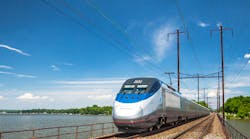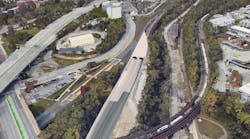Amtrak selects contractor for Southern Approach construction package for Frederick Douglass Tunnel Program
Amtrak has selected Clark Construction/Stacy and Witbeck Joint Venture as the first of three major construction contractors for the Southern Approach construction package (Package B) for the Frederick Douglass Tunnel Program. The award follows a yearlong competitive procurement that began in June 2022 for Package B.
“This award represents the culmination of years of hard work to deliver significant long-term improvements right in the heart of a vital segment of the Northeast Corridor,” said Amtrak Executive Vice President, Capital Delivery Laura Mason. “Building the new Frederick Douglass Tunnel along with the other program improvements is a win-win for Baltimore that will create thousands of jobs and improve the experience for thousands of customers who rely on this critical connection every day.”
The entire investment for the Frederick Douglass Tunnel is estimated at approximately $6 billion, which is supported in part by federal funding from the Infrastructure Investment and Jobs Act, along with contributions from Amtrak and the state of Maryland.
“This progress is more evidence of how rail investments create jobs and opportunity in local communities,” said Federal Railroad Administration Administrator Amit Bose. “The Federal Railroad Administration is proud of our support of the new Frederick Douglass Tunnel and this project is one of several we plan to move forward through the Bipartisan Infrastructure Law and as part of our agency’s commitment to modernizing and expanding passenger rail.”
Package B is being delivered using a Construction Manager At-Risk delivery method and includes:
- Building a new ADA-accessible West Baltimore MARC Station
- Constructing the southern approach from south of the West Baltimore Station area and extending north to the new Frederick Douglass Tunnel south portal
- Replacing multiple railroad undergrade bridges (N. Warwick Ave., W. Mulberry St., and W. Franklin St.)
- Replacing the Edmondson Avenue and W. Lafayette Ave. bridges
- Relocating and realigning various utilities
“This important milestone moves us one step closer to bringing the long-anticipated replacement of the B&P Tunnel into fruition,” said Maryland Transportation Secretary Paul J. Wiedefeld. “We look forward to continued collaboration with Amtrak as we deliver this vital connection and enhance overall mobility for commuters in Baltimore and beyond.”
“The Frederick Douglass Tunnel is a critical infrastructure project, which will improve mobility and access for riders across the region,” said Maryland Transit Administrator Holly Arnold. “Improvements to the West Baltimore MARC station are key to the transforming MARC Train from commuter rail to regional rail.”
Additionally, separate contracts have been awarded to K.K. Adams and Delaware Cornerstone Builders, two local Small Business Enterprises that will complete supplemental preconstruction activities ahead of major construction.
Construction contracts for other portions of the project are being procured separately:
- “Package A” – Frederick Douglass Tunnel construction: Currently in procurement; anticipated award later this year
- “Package C” – Tunnel Fit Out (tunnel track, systems and ventilation facilities): Future procurement details to be announced; anticipated award in 2025/2026
Amtrak continues to advance design, property acquisitions and preparations for other smaller construction projects associated with the Frederick Douglass Tunnel Program, which will transform the Northeast Corridor in West Baltimore and unlock the largest rail bottleneck between Washington, D.C., and New Jersey.
As the program progresses, these major construction contracts will support and complement other work which Amtrak’s Infrastructure Maintenance and Construction Service (IMCS) team will complete. The first project, completed by IMCS this summer, included replacing aging wooden ties with new concrete ties, installing new rail and completing track drainage improvements, which improved ride quality, increased track speed and will minimize the impact of future construction activities on operations.






